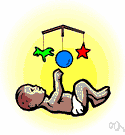newborn
(redirected from newborns)Also found in: Thesaurus, Medical, Idioms, Encyclopedia.
new·born
(no͞o′bôrn′, nyo͞o′-)adj.
1. Very recently born: a newborn baby.
2. Born anew: newborn courage.
n.
A neonate.
American Heritage® Dictionary of the English Language, Fifth Edition. Copyright © 2016 by Houghton Mifflin Harcourt Publishing Company. Published by Houghton Mifflin Harcourt Publishing Company. All rights reserved.
newborn
(ˈnjuːˌbɔːn)adj
1.
a. recently or just born
b. (as collective noun; preceded by the): the newborn.
2. (of hope, faith, etc) reborn
Collins English Dictionary – Complete and Unabridged, 12th Edition 2014 © HarperCollins Publishers 1991, 1994, 1998, 2000, 2003, 2006, 2007, 2009, 2011, 2014
new•born
(ˈnuˈbɔrn, ˈnyu-)adj., n., pl. -born, -borns. adj.
1. recently or only just born.
2. reborn.
n. 3. a newborn infant; neonate.
Random House Kernerman Webster's College Dictionary, © 2010 K Dictionaries Ltd. Copyright 2005, 1997, 1991 by Random House, Inc. All rights reserved.
ThesaurusAntonymsRelated WordsSynonymsLegend:
Switch to new thesaurus
| Noun | 1. |  newborn - a baby from birth to four weeks newborn - a baby from birth to four weeks babe, baby, infant - a very young child (birth to 1 year) who has not yet begun to walk or talk; "the baby began to cry again"; "she held the baby in her arms"; "it sounds simple, but when you have your own baby it is all so different" liveborn infant - infant who shows signs of life after birth low-birth-weight baby, low-birth-weight infant - an infant born weighing less than 5.5 pounds (2500 grams) regardless of gestational age; "a low-birth-weight infant is at risk for developing lack of oxygen during labor" postmature infant - infant born after 42 weeks of gestation; usually shows signs of placental insufficiency preemie, premature baby, premature infant, premie, preterm baby, preterm infant - an infant that is born prior to 37 weeks of gestation SGA infant, small-for-gestational-age infant - an infant whose size and weight are considerably less than the average for babies of the same age stillborn infant - infant who shows no signs of life after birth term infant - infant born at a gestational age between 37 and 42 completed weeks |
| Adj. | 1. | newborn - recently born; "a newborn infant" |
| 2. | newborn - having just or recently arisen or come into existence; "new nations"; "with newborn fears" new - not of long duration; having just (or relatively recently) come into being or been made or acquired or discovered; "a new law"; "new cars"; "a new comet"; "a new friend"; "a new year"; "the New World" |
Based on WordNet 3.0, Farlex clipart collection. © 2003-2012 Princeton University, Farlex Inc.
newborn
nounThe American Heritage® Roget's Thesaurus. Copyright © 2013, 2014 by Houghton Mifflin Harcourt Publishing Company. Published by Houghton Mifflin Harcourt Publishing Company. All rights reserved.
Translations
novorozený
nyfødt
vastasyntynyt
novorođen
生まれたばかりの
갓난
nyfödd
แรกเกิด
mới sinh
Collins Spanish Dictionary - Complete and Unabridged 8th Edition 2005 © William Collins Sons & Co. Ltd. 1971, 1988 © HarperCollins Publishers 1992, 1993, 1996, 1997, 2000, 2003, 2005
newborn
[ˈnjuːbɔːrn] adj → nouveau-né(e)
a cradle for his newborn child → un berceau pour son enfant nouveau-né
a newborn baby → un nouveau-néNew Brunswick [ˌnjuːˈbrʌnzwɪk] n → Nouveau-Brunswick mnew build new-build [ˈnjuːbɪld] n → constructions fpl nouvelles
a cradle for his newborn child → un berceau pour son enfant nouveau-né
a newborn baby → un nouveau-néNew Brunswick [ˌnjuːˈbrʌnzwɪk] n → Nouveau-Brunswick mnew build new-build [ˈnjuːbɪld] n → constructions fpl nouvelles
Collins English/French Electronic Resource. © HarperCollins Publishers 2005
newborn
[ˈnjuːˌbɔːn] adj → neonato/anewborn baby → neonato/a
Collins Italian Dictionary 1st Edition © HarperCollins Publishers 1995
newborn
→ وَلِيدٌ novorozený nyfødt neugeboren νεογέννητος recién nacido vastasyntynyt nouveau-né novorođen neonato 生まれたばかりの 갓난 pasgeboren nyfødt nowonarodzony recém-nascido новорожденный nyfödd แรกเกิด yeni doğan mới sinh 新生的Multilingual Translator © HarperCollins Publishers 2009
new·born
n. neonato-a, infante nacido a las 37 semanas de una gestación normal.
English-Spanish Medical Dictionary © Farlex 2012
newborn
n recién nacido -da mf; premature — recién nacido prematuro, prematuro -ra mf (fam)English-Spanish/Spanish-English Medical Dictionary Copyright © 2006 by The McGraw-Hill Companies, Inc. All rights reserved.